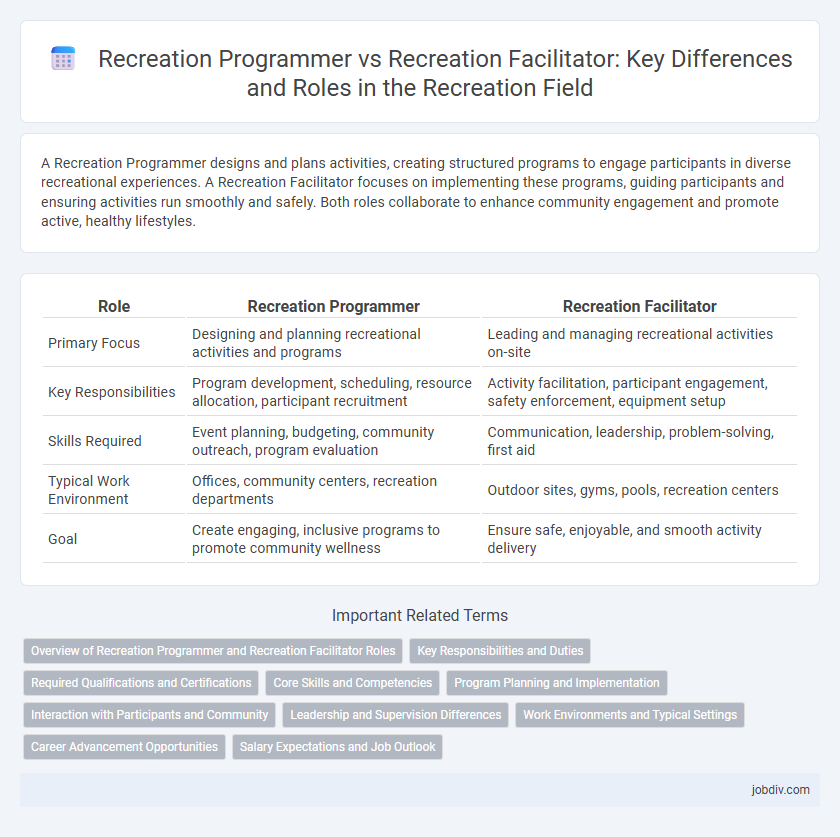A Recreation Programmer designs and plans activities, creating structured programs to engage participants in diverse recreational experiences. A Recreation Facilitator focuses on implementing these programs, guiding participants and ensuring activities run smoothly and safely. Both roles collaborate to enhance community engagement and promote active, healthy lifestyles.
Table of Comparison
| Role | Recreation Programmer | Recreation Facilitator |
|---|---|---|
| Primary Focus | Designing and planning recreational activities and programs | Leading and managing recreational activities on-site |
| Key Responsibilities | Program development, scheduling, resource allocation, participant recruitment | Activity facilitation, participant engagement, safety enforcement, equipment setup |
| Skills Required | Event planning, budgeting, community outreach, program evaluation | Communication, leadership, problem-solving, first aid |
| Typical Work Environment | Offices, community centers, recreation departments | Outdoor sites, gyms, pools, recreation centers |
| Goal | Create engaging, inclusive programs to promote community wellness | Ensure safe, enjoyable, and smooth activity delivery |
Overview of Recreation Programmer and Recreation Facilitator Roles
Recreation Programmers develop, plan, and evaluate community programs and events tailored to diverse populations, emphasizing strategic resource management and program innovation. Recreation Facilitators focus on implementing and leading recreational activities, ensuring participant engagement and safety while adapting programs to meet immediate group needs. Both roles collaborate to enhance community well-being through effective recreational services, with Programmers handling conceptual design and Facilitators managing on-the-ground execution.
Key Responsibilities and Duties
A Recreation Programmer designs, plans, and evaluates community activities and events to promote social engagement and physical well-being, managing budgets and coordinating with stakeholders. A Recreation Facilitator leads and supervises recreational activities, ensuring participant safety, providing instruction, and fostering inclusive environments. Both roles prioritize enhancing community participation but differ in their focus on strategic planning versus hands-on program delivery.
Required Qualifications and Certifications
Recreation Programmers typically require a bachelor's degree in recreation management, kinesiology, or a related field, alongside certifications such as Certified Park and Recreation Professional (CPRP) or First Aid/CPR. Recreation Facilitators often need a high school diploma or associate degree, with emphasis on certifications like First Aid/CPR and specialized training in group facilitation or adaptive recreation. Both roles benefit from experience in program planning and strong interpersonal skills, but Programmers generally hold higher educational qualifications and more specialized certifications.
Core Skills and Competencies
Recreation Programmers excel in strategic planning, program development, and budgeting, ensuring recreational activities align with community needs and organizational goals. Recreation Facilitators demonstrate strong interpersonal communication, group management, and activity leadership skills, fostering participant engagement and safety. Both roles require knowledge of recreational trends, risk management, and inclusivity to deliver dynamic and accessible programs.
Program Planning and Implementation
A Recreation Programmer designs comprehensive activities and events based on community needs, incorporating strategic objectives and resource allocation for successful program planning. In contrast, a Recreation Facilitator focuses on the direct execution and supervision of these activities, ensuring participant engagement and smooth operation during implementation. Both roles require collaboration, but the Programmer emphasizes development and coordination while the Facilitator prioritizes hands-on delivery and participant interaction.
Interaction with Participants and Community
Recreation Programmers design and coordinate activities tailored to community needs, ensuring inclusive engagement through strategic planning and participant feedback. Recreation Facilitators directly interact with participants during events, fostering a supportive environment that encourages active involvement and personal growth. Both roles prioritize community connection but differ in the balance between organizational responsibilities and hands-on participant engagement.
Leadership and Supervision Differences
Recreation Programmers design and develop comprehensive activity plans, showcasing strong leadership in strategic planning and resource management, while Recreation Facilitators primarily focus on the direct supervision and implementation of these activities, ensuring participant engagement and safety. Programmers often lead teams and coordinate with stakeholders, emphasizing high-level decision-making, whereas Facilitators provide frontline leadership by guiding participants and managing on-site logistics. The distinct supervisory roles highlight the Programmer's responsibility for program oversight and the Facilitator's focus on operational execution and participant support.
Work Environments and Typical Settings
Recreation Programmers typically work in community centers, parks and recreation departments, and municipal agencies, designing structured activity schedules and managing program logistics. Recreation Facilitators often operate in more interactive environments such as health clubs, schools, and senior living facilities, focusing on leading group activities and providing direct participant support. Both roles require adaptability to various settings, but Programmers emphasize planning and coordination while Facilitators prioritize engagement and hands-on delivery.
Career Advancement Opportunities
Recreation Programmers typically have greater career advancement opportunities due to their responsibilities in designing, planning, and evaluating recreation programs, which often lead to supervisory or managerial roles. Recreation Facilitators focus primarily on leading activities and directly engaging with participants, providing foundational experience but fewer leadership prospects. Expertise in programming development and strategic planning enhances promotional potential within municipal departments, community centers, and nonprofit organizations.
Salary Expectations and Job Outlook
Recreation Programmers typically earn higher salaries, with median annual wages around $45,000 to $55,000, due to their responsibilities in designing and coordinating community programs. Recreation Facilitators, earning approximately $30,000 to $40,000 annually, focus on leading activities and directly engaging participants. Job outlook for Recreation Programmers shows a moderate growth rate of 7% through 2030, reflecting rising demand for program development, while Recreation Facilitators face steady employment prospects driven by community and leisure service expansions.
Recreation Programmer vs Recreation Facilitator Infographic

 jobdiv.com
jobdiv.com